Windows 7 Performance Guide
by Ryan Smith and Gary Key on October 26, 2009 12:00 AM EST- Posted in
- Systems
Laptop Performance
With the different power and performance characteristics of a laptop (not to mention the battery!) we’re going to break out our laptop results from the rest of our desktop data.
If you have seen our OS Mobility Explored article, where we compared laptop usage across Windows and Linux, then you should have a pretty good idea of what you’re about to see. The following is a selection of the most relevant data from that article, using Gateway’s very similar Intel and AMD power laptops: the NV5807u and NV5214u respectively.

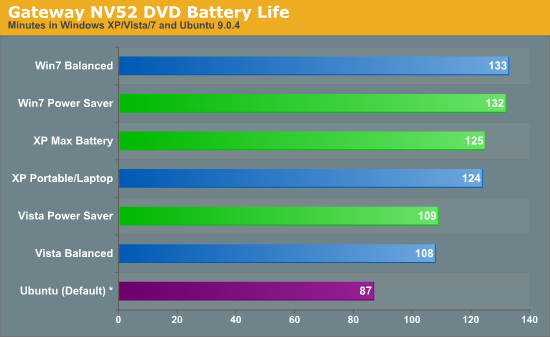
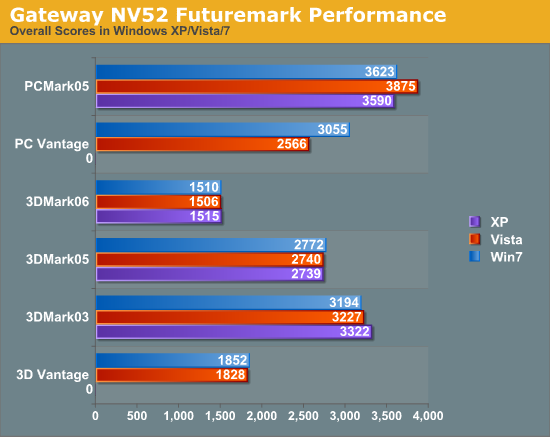
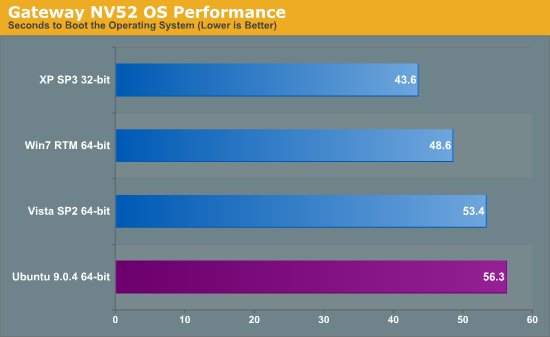
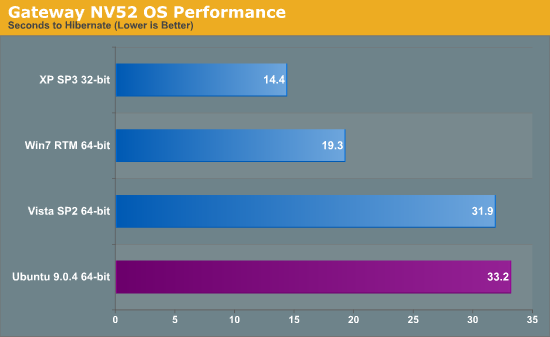
Starting with the NV52, our Athlon 64 X2 laptop, we see some immediate advantages for Windows 7. In terms of battery life it edges out Windows XP in all situations, and clearly surpasses Vista, particularly in DVD playback. As laptops have been one of Vista’s most troublesome areas, it’s here where Microsoft needed to see some real improvement, and they have delivered.
Meanwhile performance in our limited suite of benchmarks is largely tied. Vista wins in PCMark 05 only due to higher scores in the transparent windows test (something we suspect is a product of the WDDM 1.1 memory optimizations), XP takes 3DMark 03, and Win7 takes PCMark Vantage. Our tendency is to put more weight in to PCMark Vantage, since it’s quantifying the improved laptop performance that we’ve been experiencing, but aren’t necessarily seeing in other benchmarks.
Finally we have boot and hibernation times. Microsoft has been putting some effort in to bringing down the boot times of Vista, and it shows here, although XP is too tough to beat. Hibernation is a similar story – it’s easier to resume from hibernation when you have less stuff to load.
The NV52 paints what’s probably going to be the average picture for Windows 7 on laptops. It’s as fast (if not faster) than XP and can pull off a slightly better battery life, but it’s not going to be able to beat XP in booting/hibernating.
Next we have the NV58, our Intel C2D laptop.
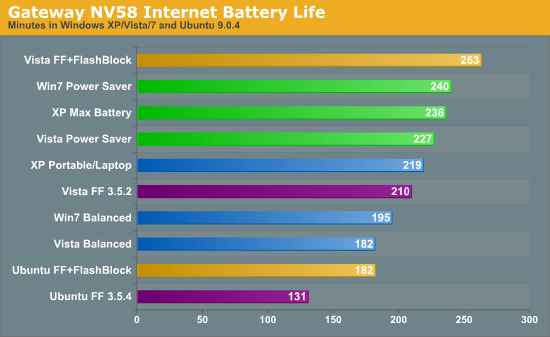
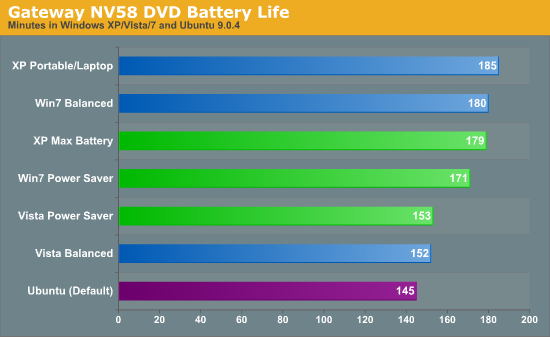
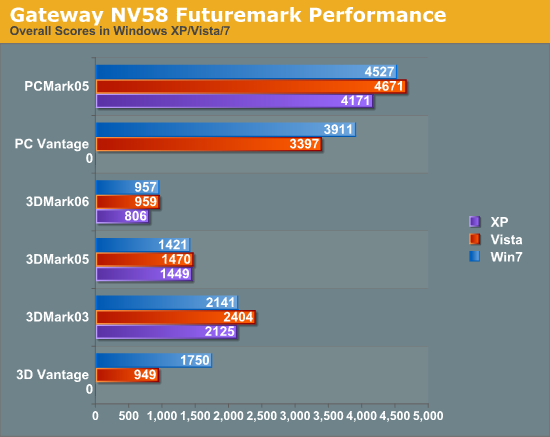
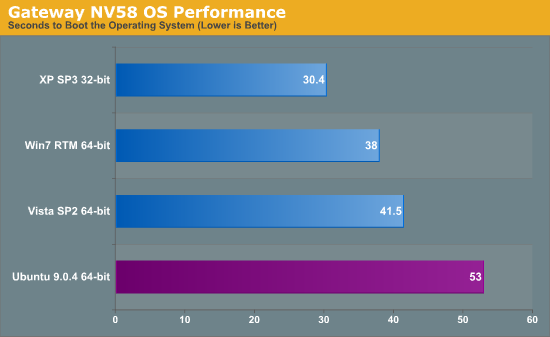
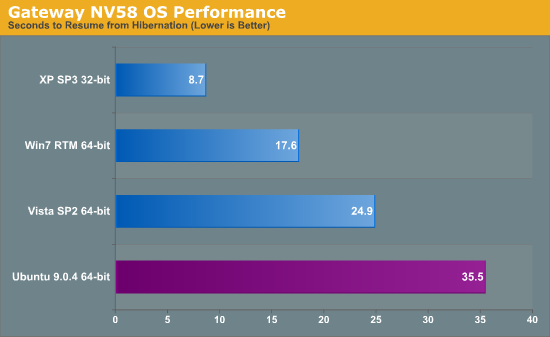
With battery life, we see some things similar to the AMD based NV52, and some things are different. Vista is still a loser, but Win7 doesn’t manage to build any kind of lead over XP in DVD playback, letting XP take it by a small margin. Battery life in our internet testing does go to Win7 however, once again with a small margin.
As for performance, we largely have the same results as with the NV52. Win7 wins PCMark Vantage, the test we care the most about, and pulls near-even elsewhere. 3DMark Vantage is an outlier this time, but this seems to be related to the Intel integrated graphics in this laptop.
Finally boot and hibernation times are similar to what we saw with the NV52. XP is still faster to boot and faster to return from hibernation, the benefit of an older, lighter-weight operating system. Win7 does handily beat Vista in all cases, however.










207 Comments
View All Comments
Genx87 - Tuesday, October 27, 2009 - link
God who cares. Really? Vista wasnt called Windows 6 either. We all knew this was an incremental OS. The core components are Vista. They just trimmed some of the rough edges.danielkza - Monday, October 26, 2009 - link
Microsoft already replied to this: version 6 is kept for compatibility purposes, since pretty much everything that worked in Vista should need no changes to run in Windows 7.I see no reason to do major kernel changes on each release: they did what they had to and cleaned up the 16-bit remains in Vista, and just tweaked some rough edges for Windows 7. And it worked out pretty well: even if it's not much faster than Vista, it looks like it, and in the end, that's what matters to pretty much everyone.
nafhan - Monday, October 26, 2009 - link
I think that's pretty much the point. From a technical standpoint, it's a service pack plus GUI changes. From a marketing and user perception standpoint, there's a strong desire to move away from Vista. So, they went with Windows 7 instead of Windows Vista SP2.AnnihilatorX - Monday, October 26, 2009 - link
for not supporting FLAC natively by Media player and FLAC media tagging under explorer columns/Open Source Loseless Audio Movement
takumsawsherman - Monday, October 26, 2009 - link
"you’re never going to stuff something like Windows 7 in to the performance characteristics of an 8 year-old OS that forgoes real security and predates wireless networking."This is partially true, but only because Microsoft makes it so. They release a monstrosity of an OS that runs like a dog, tell everyone it's better and faster than the previous release, and tra la la, most follow along. They could have developed an OS that was more secure, less of a performance nightmare, and satisfied the wants and needs of it's users. But that's not Microsoft's only goal. They have all sorts of other interests that get in the way of that goal, and subjugate "what is good for the user" to what MS thinks is good for MS.
Regarding pre-dating wireless networking, I hardly think that Windows XP was more than an apple in Bill's eye when the world was beginning to adopt wireless networking. Apple had the airport in 1999, and Windows XP shipped with wireless support built in.
Windows XP itself was no great performer. It only looks that way when you compare it with Vista and 7. Another inaccuracy in the article is your portrayal of Snow Leopard as a minor update compared with 7. I am still testing SL for customers, but the performance gains are incredible considering Leopard was already fast, the management tools are vastly improved, and almost all pieces have shown very nice improvements (the network-awareness is phenomenal, finding computers, printers, etc. extremely quickly, and with none of the halting behavior of Windows when navigating).
Also, you mention that XP is insecure. I totally agree with you on this. I spend a good portion of my time cleaning infections from XP machines. However, I spend just as much time (proportionally by installed base) cleaning them from Vista. Are you saying that someone who is using Windows 7, and visits the NY Times on the wrong day won't be infected? Or someone won't end up with the latest version of "Personal Antivirus Pro 2009" or some other dreck?
I would be happy if 7 doesn't suffer from these problems. That's a lot more time for me to spend with my family. But I have a feeling that the real security problems that real people face every day with XP and Vista will remain on 7. I just hope some of the better tools will be updated as well.
Griswold - Tuesday, October 27, 2009 - link
All this blabla about performance... both vista and 7 are at least as fast if not faster on quite a few things than XP. Its a fact. Everyone who denies this and still claims otherwise should perhaps not spend so much time with computers, as it seems it is a waste of time.As for your example with the infections of vista and 7. Yes, I'm sure he would be saying that because its true. I dont know what the fuck your people are doing with their machines, but at least a vista machine that wasnt "optimized" to become vulnerable to any type of attack, isnt going to be infected as easily as XP - ever.
Xentropy - Monday, October 26, 2009 - link
Upgraded from 32-bit XP to 64-bit Windows 7 Professional for $99 in the preorder sale. I find it $99 well spent. Good price for 8 years worth of upgrades, and since I never even tried Vista due to all the horror stories and XP being "good enough" for my usage patterns (mostly RTS/TBS/MMO gaming--not the DX10 FPS stuff), I find it a HUGE change (increased performance and all) and well worth the money. Basically I got to skip the Vista generation and pay less than Vista would've cost for a similar feature set thanks to the preorder sale and move of all the important (to me) features into Pro from the overpriced Ultimate.I can see a bit why the article is so down on Windows 7, largely because of the prices available today. But at preorder prices, Windows 7 is a slam dunk. It's a shame Microsoft didn't make those the permanent upgrade pricing.
Spivonious - Monday, October 26, 2009 - link
I agree. MS should have kept the Home upgrade at $50. I'm not sure who's buying Pro, since it doesn't have many more features that a home user would be interested in. Business users are going to have a volume licensed Enterprise version.Griswold - Tuesday, October 27, 2009 - link
No, business users in *general* arent going to use volume licenses.Do you really think small companies with 1-3 machines are interested in volume liceneses? No, they buy the professional version.
Certainly not the home premium one - and if its only for the XP mode that may be useful for some of their older software and doesnt require a seperate license of XP on each machine.
Genx87 - Tuesday, October 27, 2009 - link
Microsofts Volume License since Vista imo has been a clusterfuck. Requiring an on site activation server with check ins ever 6 months or the OS locks you out. That really puts a level of complexity not needed in an OT admins life. Especially with remote users who literally never touch your network for years at a time.When I make hardware purchases I do it with the OEM install.